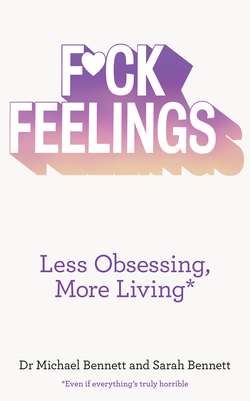Читать книгу F*ck Feelings: Less Obsessing, More Living - Sarah Bennett - Страница 14
Chapter Two Fuck Self-Esteem
ОглавлениеPeople think self-esteem is the hallmark of good mental health, but, given the number of people who base their self-worth on having good looks, a positive outlook, money, or just luck, that assessment doesn’t mean much. Donald Trump has more than enough self-esteem, but if what’s going on on top of his head is a reflection of what’s going on inside, then his mental health is in trouble.
Indeed, people who feel good because of something they really don’t control are the first to feel like failures when their luck sours and they lose whatever they thought of as their claim to fame. Add to this the way advertisers encourage you to think their product will make you a winner—sexy, beautiful, fashionable—and you have reason to classify self-esteem, as it’s usually experienced, as a dangerous drug that should have a black box warning.
Further proof of the risk of overvaluing self-esteem is offered by those people who have too much self-esteem and see themselves as superior and exceptional (see sidebar on here). They’re the ones who have little awareness of their ability to act like jerks and cause unnecessary harm. They are proud of their ability to be honest and speak out about truths that others are too polite or timid to talk about; they believe in themselves to the point of self-worship, and, most important, they’re usually Assholes (see chapter 9).
The Gospel of Self-Esteem would argue that you can’t stand up for yourself until you love yourself enough, thus making self-esteem an essential vitamin to take before you can gain control of your life and do what you think is right without being overly influenced or intimidated by others. This gospel can be read in psalms of Oprah, Tony Robbins, and even the most holy, RuPaul.
If this were true, however, many people who are anxious, shy, or compulsively self-doubting would be doomed to a life of passivity and paralysis, and clearly they aren’t. People who have done terrible things wouldn’t be able to move forward until they found some way to redeem themselves, which if you’ve seen an MSNBC weekend Lockup-athon, is clearly not true. A lot of people would be stuck in a rut, lacking the self-esteem to do things that would make them like themselves and thus give them self-esteem.
Fortunately, you don’t have to have self-esteem to value things in life apart from wealth, good luck, and good feelings. When shy people find the strength to deal with people because they’re determined to make a living and support themselves, or when an ugly person socializes because of a wish to be positively involved with others, or when a mean-drunk alcoholic tries to get sober, they’re acting according to their idea of what’s good, and their actions build self-esteem, regardless of how bad they feel about themselves or whether they succeed.
Doing what you believe is worthwhile is the only source of real self-esteem, even if doing so makes you feel inferior, exposed, and ashamed in the short run. Loss of self-esteem in the service of good values is no sin; self-esteem arising from good feeling is no virtue.
That’s why people who are extremely unlucky, like those in my practice with severe mental illness, need never feel excluded from the supposed healthiness of high self-esteem. They may be chronically disabled, preoccupied with voices in their heads, careless of their appearance, and unable to work. If, however, they find a way to help one another, or do something useful with whatever abilities they have, they can and should have as much true confidence as people who are normal or gifted. Indeed, they should have more, because their challenge is greater and their achievement that much more awesome.
